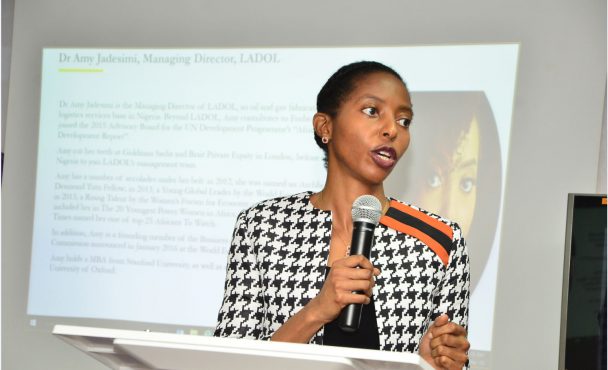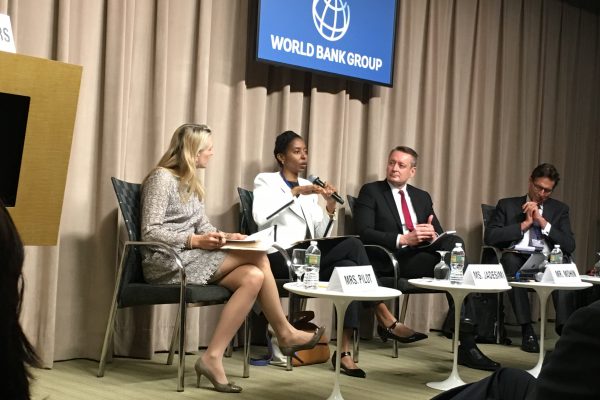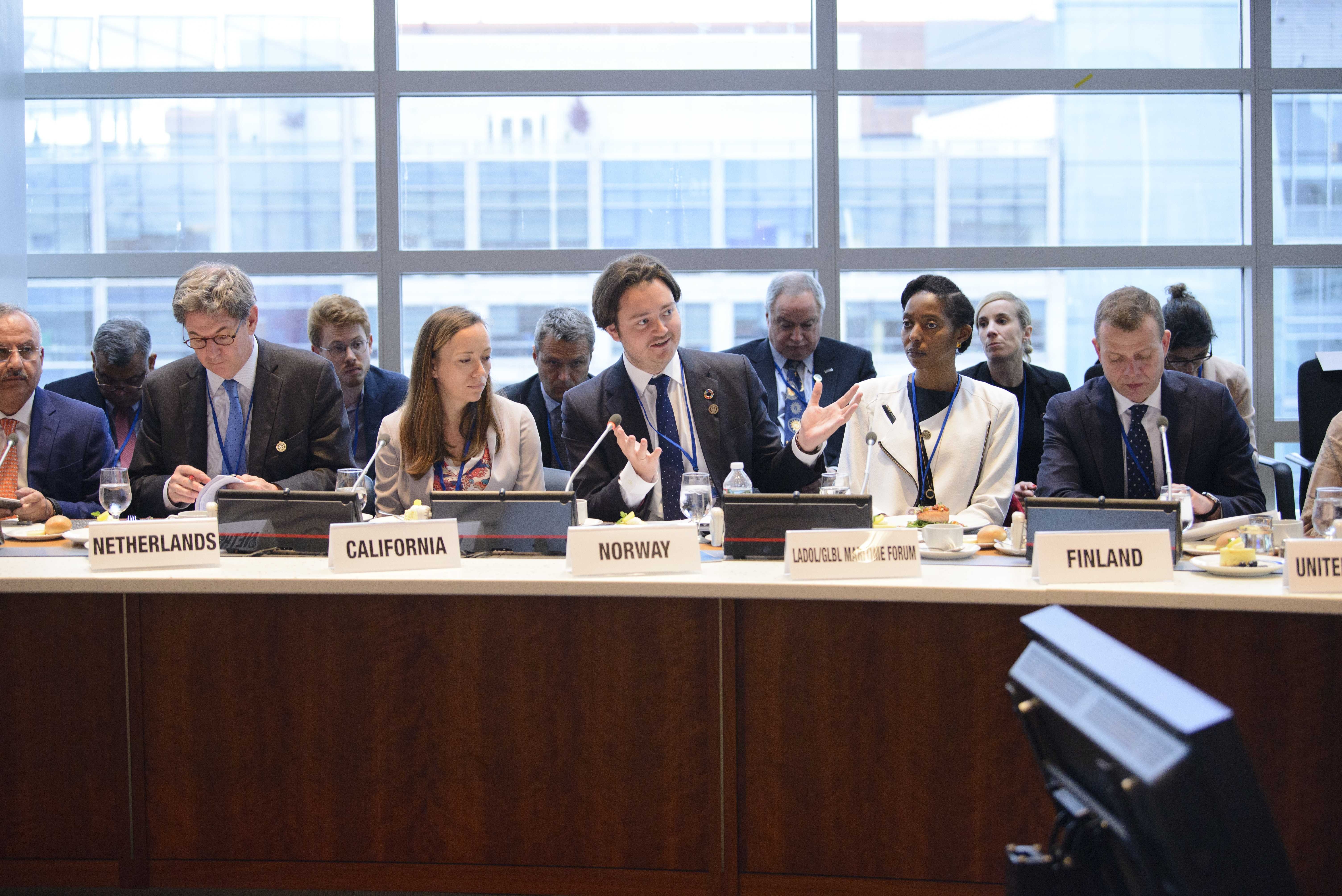Category Archives: Home Page news
LADOL Sponsors Nigerian-American Chamber of Commerce
LADOL Executive Director Jide Jadesimi has recently delivered a presentation to the Nigerian-American Chamber of Commerce at a LADOL sponsored breakfast briefing. Jide updates the attendees on the progress of LADOL and the Egina project.
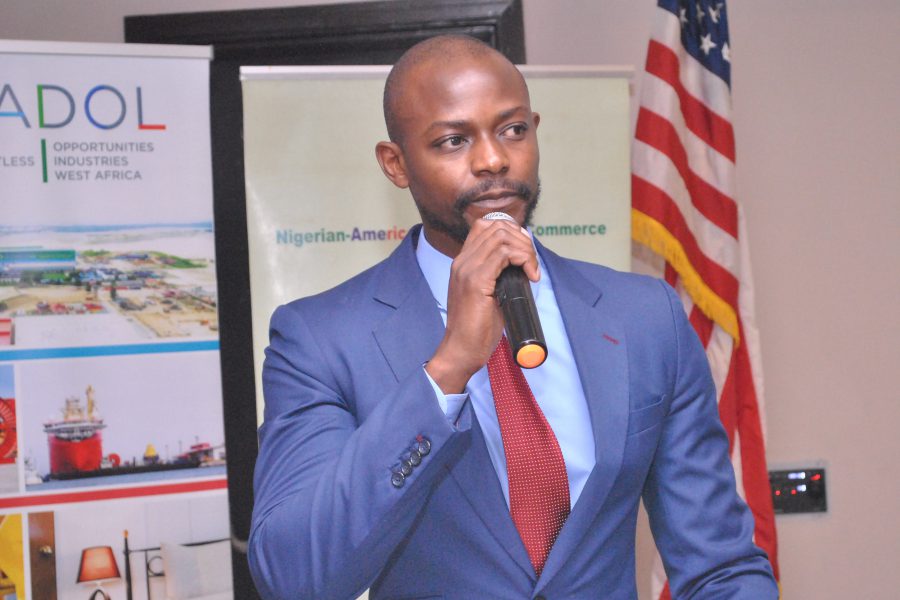
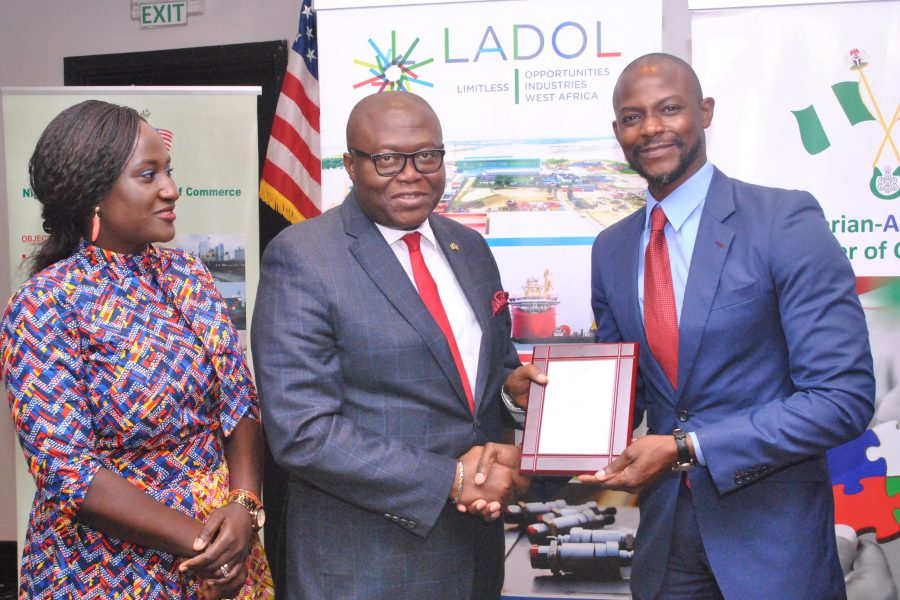
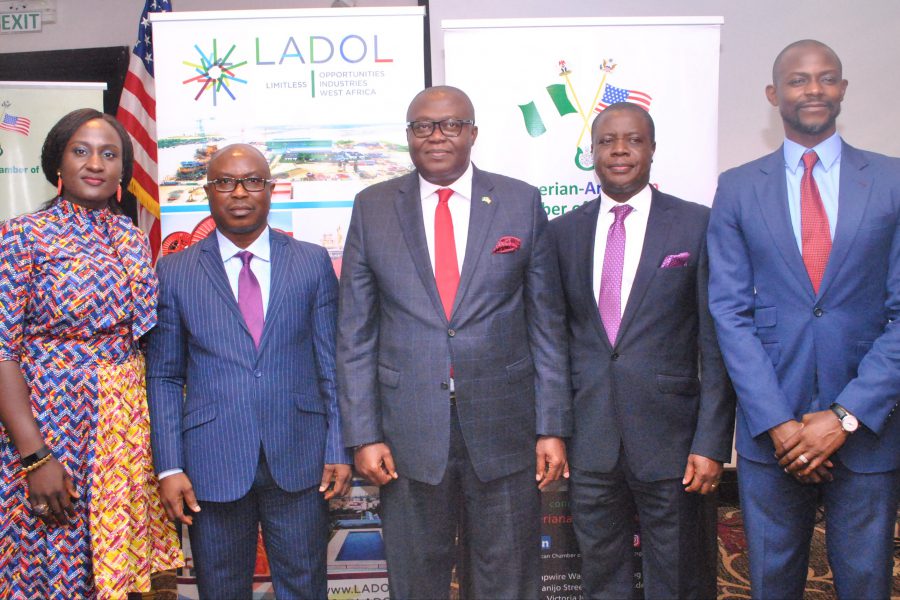
LADOL MD Asks UN To Support Private Sector In Developing Countries
Dr. Amy Jadesimi, MD LADOL, has urged the United Nations to support private sector companies in low income high growth economies such as Nigeria. Dr. Amy made the call while speaking at the Sustainable Development Goal (SDG) business forum recently held at the UN headquarters in New York.
She said the private sector in high growth countries are increasingly operating sustainably because of their “winning business strategy”.
Some of Dr. Amy’s comments at the forum are listed below.
“LADOL is a great case study for the significance and rapid impact indigenous sustainable business can have in high-growth, low-income markets”
“There is a sense that the direction of travel with regards to SDGs is going in the wrong direction but there is a dichotomy between low-growth wealthy countries where sustainability will be resisted. In wealthy countries you are asking people to give up something they have in their hands for a promise of a better future. In low-income, high-growth countries, where the majority of the world’s population lives and will increasingly live, there are wide open opportunities and real local private companies are moving in the right direction.”
“The real private sector in high-growth countries is increasingly operating sustainably because this is the winning business strategy.”
“Governments in wealthy countries will need to step up and impose strict regulatory policies to ensure their private sector operates sustainably both at home and abroad. Governments in poorer countries should please focus on providing a level playing field, so the private sector can invest, add value and create prosperity”
“The private sector can lead and invest in achieving the SDGs, but they must have access.”
“I urge the UN to take up the cause of creating level playing fields in all markets. The venerable institutions represented here should also focus on preventing multinationals from colluding with certain government officials and politically exposed people in low-income, high-growth countries to impose monopolies in those countries that actively and maliciously stop the real private sector from participating in and bringing sustainability to these markets”
“Access to water for all is critical; private sector can play a huge rule in providing solutions even in the most challenging situations. However, we should ensure that they have access and are not crowded out by NGOs and/or government policies.”
“The B Team Africa is a great organisation through which private sector companies can come together, share best practice and lobby for change. It is also one of the organisations that is giving a voice to indigenous companies – we know what we need to do, but we need to work together to do it.”
“Low-income, high-growth countries are the engine that will drive the world towards sustainability. I urge the UN and the delegates present to focus on policies and solutions to effectively engage with and support the real private sector companies in these regions”
“All businesses should be long-term focused”
“I hope the UN will help enforce regulations against companies that violate human rights and perpetuate the worst practices of the status quo, while simultaneously focusing on policies and solutions that engage and empower the real private sector companies in high-growth markets to flourish.”
A panel discussion with Sanda Ojiambo, Lars Lindoe, and Amy Jadesimi on the topic of “Private Sector Leading Innovative Change”, moderated by Robert Skinner.
The event took place on the side of the 2018 High-Level Political Forum (2018 HLPF). Click the image for full video.
At the forum, LADOL showed its commitment to SDG number 9: “Build resilient infrastructure, promote inclusive and sustainable industrialization and foster innovation”

Launch of the Inclusive Data Charter
MD LADOL attended the Launch of the Inclusive Data Charter at One UN Plaza today After the event she commented “This was a great breakfast meeting, keynote speaker, H.E. Prof George Gyan-Baffour, Min. Planning Ghana, was an excellent example of how this drive for evidence based decision making is being driven and utilised by the most effective African governments and private sector companies, as it must be to achieve our goals of a peaceful, prosperous, sustainable world.”
Amy Jadesimi at UN Head Quarters
The Managing Director of LADOL, Dr. Amy Jadesimi was invited to speak at the United Nations on 17th July 2018 by the B-Team Africa, GSMA, UN Foundation and the organisers of the event. She joined global CEO’s to discuss the practical and policy steps needed to unlock the potential for private sector to take a lead in achieving the 17 Sustainable Development Goals (SDGs).
As the CEO of LADOL, a wholly indigenous company, and the only African speaking on “Unlocking the power of business – multi-stakeholder collaboration” Dr. Jadesimi was able to offer a unique perspective. LADOL itself is a practical, tangible example of how the real private sector in low income high growth countries can stimulate significant economic growth and job creation through pursuing sustainable business operations and opportunities.
LADOL is an industrial Special Economic Zone, built out of a disused swamp into what is now the only fully integrated deep offshore logistics base and the largest ship yard in West Africa. These developments at LADOL could create 50,000 direct and indirect jobs. But the World Bank estimates the world needs 600 million new jobs, 80% of which will come from indigenous companies. If these companies develop sustainably they will be resilient and gain higher returns. Nonetheless the decks are still largely stacked against such indigenous enterprises. LADOL’s development took over 15 years and the journey was extremely arduous. The world has only 12 years to achieve the 17 SDGs, therefore the Managing Director of LADOL is engaging with world leaders to help put in place policies, financial solutions and partnerships that will drive investment and expertise into more real private sector companies in low income, high growth countries across the world. Ensuring that they adopt sustainability as a winning business strategy and thereby drive achievement of the 17 SDGs by 2030.
Speaking ahead of the forum, Dr. Amy Jadesimi, Chief Executive of LADOL said: “the 17 SDGs and 165 targets are a free template for the most profitable business strategies of the future, private sector will lead in achieving the SDGs, as companies that adopt sustainability now will outcompete companies that do not. In so doing they will also help to create a peaceful and prosperous sustainable world”.
Speakers for the forum include Dr. Amy Jadesimi, CEO of LADOL; Jean-Piere Clamadieu CEO, Solvay; Kimmo Tiilikainen, Environment Minister, Finland Government; Guy Ryder, Director General, ILO; Sunny Verghese, Co-founder & Group CEO, Olam International & WBCSD Chair; Ana Dolores Roman, CEO, Pfizer Ecuador.
Dr. Jadesimi was a Commissioner for the Business and Sustainable Development Commission, chaired by Lord Mark Malloch-Brown and in March 2018 she was invited to join the B-Team Africa. The B Team Africa is a coalition of Africa-based business and civil society leaders working collectively to drive progress across the continent. The B Team Africa’s leadership includes Safaricom, M-KOPA Solar, Kenya Commercial Bank Group, Isuzu East Africa, Made in Africa Initiative and SoleRebels’ CEOs, as well as Drs. Mo Ibrahim and Ngozi Okonjo-Iweala. Together, we are encouraging Africa-based companies to make strong ESG-oriented commitments, including the adoption of science-based and net-zero targets and invest in renewable, clean energy.
Breaking Through The Glass Ceiling
Dr. Jadesimi has recently written an article for We Are The City on the huge opportunity that breaking the glass ceiling presents. “It’s estimated today that equal engagement of women in the workforce will add $28 trillion US dollars to annual global GDP by 2025.
This is the equivalent of adding another United States and China to the global GDP, just by ensuring equal opportunity to women. That sounds like a pretty good trade off to me.
Across the world there are initiatives, such as the 30% Club in the UK, that aim to empower women and get more of us onto the boards of large companies. In Africa however, which is anticipated to house 25 per cent of the world’s population by 2050, progress is far from quick.”
Click here to read the full interview at wearethecity.com/span>
Nigeria on the Threshold of Sustainable Industrial Revolution
For the first time in Nigeria’s history, a local company, Lagos Deep Offshore Logistics Base (LADOL), is playing host to a $3.8 billion floating production storage and offloading (FPSO) unit, otherwise called the Egina FPSO. Applauded as first-of-its-kind in sub-Saharan Africa, the project was handled by the Korea-based Samsung Heavy Industries (SHI) on behalf of Total Oil Exploration, with LADOL serving as its local content partner. The Managing Director of LADOL, Dr Amy Jadesimi, asserts that the feat has put Nigeria on the global map. With the achievement, she believes Nigeria is on the threshold of sustainable industrial revolution. However, Jadesimi decries the level of financial scrutiny that businesses have to go through to access loans, warning that unless the federal government urgently makes policies to provide long-term, low-cost financing for small- and medium-sized businesses, the country may not be able to have global giants like the General Electric and Facebook. She speaks with Kunle Aderinokun, Eromosele Abiodun, Bayo Akinloye, and Ugo Aliogo
Click here to read the full interview at www.thisdaylive.com
Breakthrough Project of the Year Award
We are delighted to have won the Breakthrough Project of the Year award for the EGINA project at the at The Oil Council’s Africa Assembly 2018 conference in Paris.
The Oil & Gas Council is the largest and most influential network of senior oil & gas, finance and investment executives in the world.
They broker relationships and provide unique networking opportunities for our individual members and corporate partners year-round, through dozens of tailored experiences.
The Africa Assembly is recognised as the region’s most influential corporate development, strategy, finance and investment gathering. It is a catalyst for the growth and development of the African energy industry.
The theme for the 2018 Africa Assembly was ‘The New African Horizon’.
High-Level Roundtable on Integrated Reporting Transparency
MD LADOL, Dr. Amy Jadesimi, speaks on High-Level Roundtable on Integrated Reporting Transparency as a Catalyst for Efficient Resource Allocation and Sustainable Development, hosted by Mr. Joaquim Levy Managing Director and Chief Financial Officer, World Bank
The panel discussion at this event was very lively, informative and frank. Dr. Jadesimi was joined on the panel by, Mr. Tim Mohin – Chief Executive, Global Reporting Initiative and Mr. David Young – Senior Partner and Managing Director (Social Impact), Boston Consulting Group. The panel was chaired by Sallie Pilot, Director, Black Sun Plc.
Dr. Jadesimi commented “In 2017 the report ‘Better Business, Better World’ published by the Business and Sustainable Development Commission showed how the global economy could be increased by USD 12 trillion, by 2030 if the private sector pursued sustainable business models in just four verticals (healthcare, cities, energy and agriculture). Companies like LADOL are grabbing this opportunity, by making long term investments building sustainable infrastructure, facilities and operations – creating jobs and prosperity in the highest growth markets of the world. Transparency in reporting will highlight the high returns investors get from sustainable companies and the comparatively poor performance and prospects of old economy companies with low ESG. Integrated reporting is one of the most important and yet underutilized tools that analysts and investors should be using to make their decisions. Given how crucial it is to shift investment into sustainable local companies, in high growth low income markets, I hope that the World Bank will be bold and aggressive and publish criteria by which we can measure company’s sustainability, in partnership with International Integrated Reporting Council (IIRC) in 2018.”
High-Level Assembly to Discuss Carbon Pricing in Maritime Transport
The Global Maritime Forum – an international not-for-profit foundation committed to shaping the future of global seaborne trade – is represented at the CPLC Third High-Level Assembly 2018 in Washington, DC today. The High-Level Assembly takes place as part of the World Bank Group/International Monetary Fund Spring Meetings, and focuses on the opportunities, benefits, and concerns related to carbon pricing.
Prior to the meeting the Global Maritime Forum’s Vice Chairman and Managing Director of LADOL, Dr. Amy Jadesimi, commented: “Last week, member states of the United Nations International Maritime Organization adopted an initial strategy to reduce the total annual GHG emissions from international shipping by at least 50% by 2050. This target could energize the private investors and operators in the maritime sector to immediately begin investing in new sustainable business models, assets (from ship yards and ships to ports) and financial solutions including carbon pricing. I therefore urge policy makers to continue setting bold targets and laying out a clear path to zero emissions.”
Click here to read the full report at globalmaritimeforum.org
A Strong African Future Needs A Strong Public Service
From a worker’s morning commute to a child’s school day, citizens across Africa utilize and rely on public works and services every day. The quality of these services are critical for a thriving continent: well-maintained roads keep communities connected and well-resourced hospitals and schools save and transform lives. These every day services directly impact the quality of life of citizens and the ability for a community to succeed economically.
The importance of the individuals and institutions that enable these services cannot be forgotten. A robust dialogue between citizens and local, national and regional civil servants is key to maintaining and delivering high-quality infrastructure. But they’re not alone in cultivating and advocating for these services. A strong future for Africa needs strong public service: one that business helps to build.
The private sector cannot ignore its place as a leader in building African infrastructure. Business action to deliver public services is necessary to bring the just future that the Sustainable Development Goals envision to life. An estimated annual USD $130-170 billion will need to be invested in African infrastructure to deliver a sustainable, equitable future across the continent.
From a private sector perspective this is not a challenge to be met, it is a business opportunity that will yield high returns for investors and local stakeholders. To help businesses access these opportunities, I’ve joined other African leaders to form The B Team Africa. This group of dynamic leaders is accelerating a new way of doing business, one which will be profitable and equitable, driving the creation of a prosperous Africa and world.
Many of us are attending the upcoming Ibrahim Governance Weekend in Kigali. Along with other global and regional leaders, we’ll be discussing public service in Africa, its relation to good governance, its challenges and ways to strengthen it. It’s a conversation and a movement that needs business-driven solutions.
Some private sector companies have realized this, most have not. We need to help companies that are already focused on this new economy to access and invest in these markets. Simultaneously we need to highlight the data and success stories that will show a wider group of investors and operators why these opportunities should not be missed.
Across Africa, and the world, more and more companies are recognising the importance of taking action on tax for a sustainable future. The UN estimates that Africa loses more than USD $50 billion through illicit financial outflows per year, primarily linked to tax avoidance and evasion. Business is increasingly stepping up to help combat these losses and corrupt practices.
In February nine leading multinationals, including Safaricom, endorsed The B Team’s Responsible Tax Principles. This signaled their commitment to responsibly managing tax policy to provide healthy, robust and adaptive resources for citizens. Corporates are recognising that the shift toward a sustainable and prosperous future can’t happen without a shift in their approach to tax.
In Africa, the dialogue on responsible tax is gaining necessary momentum with dialogue and partnerships between companies, civil society organisations and governments forming. Businesses are working closely with these actors to collaborate not only on tax, but also on responsible and transparent public procurement.
On average, across the continent, half of government spending goes toward public contracts. But often, governments don’t know who they’re buying from or if they’re getting a fair price. Many times, vendors don’t even complete the work they’ve been contracted to do. This leaves communities debilitated with failing infrastructure and inadequate public services.
There is, however, a solution: open contracting. By making contracts open, data on the entire procurement process, from planning to tendering to performance and contract closure is made available to the public. It holds governments accountable and opens market opportunities for business.
In Africa, open contracting is growing. Uganda has implemented a strong open contracting system and other African countries are following suit. The African Partner Pool has also opened up opportunities for African small-to-medium enterprises (SMEs). Since its launch last year, this platform has provided USD $15 million worth of tenders for more than 800 SMEs. Through transparent and fair bidding, open contracting systems build and provide strong public services while providing market access for often overlooked businesses.
Beyond funding and constructing, the private sector must also champion the mechanisms and policies that allow for a healthy dialogue between citizens and public servants. Across Africa, civil society participation and civic space are deteriorating. Business has a role to play to ensure citizens can voice concerns around public services, hold officials accountable and access information. And while many companies are realising this, more need to join them to ensure an enabling environment for strong public service in Africa.
From changing operational practices to advocating for key policies, it’s time for African business to focus on strengthening the continent’s public service. This is not just the work of governments or civil society. A strong, thriving and just future for Africa is on the line. And it’s up to all of us – Âbusiness, governments and civil society – Âto deliver.
Dr. Amy Jadesimi
Managing Director, LADOL
23/04/2018




